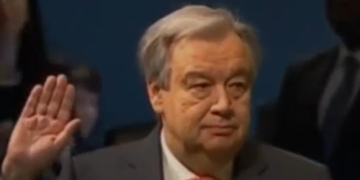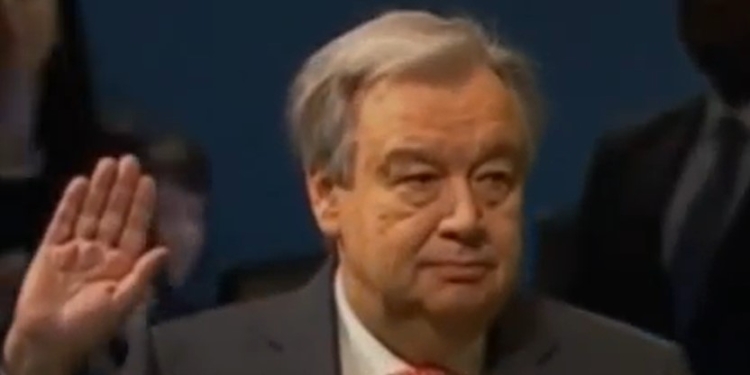In his unending quest to constantly heat up fright rhetoric about climate change, United Nations Secretary-General Antonio Guterres last week referred to oil companies as “the godfathers of climate chaos” and urged national governments to place bans on their ability to advertise their products.
Speaking at an event called World Climate Day, Guterres told attendees that “we are playing Russian roulette with our planet,” adding, “we need an exit ramp off this highway to hell.”
The latter bit of hyperbolic nonsense was a reference to a bit of fright rhetoric he unveiled during the COP27 conference held in Egypt in November 2022. In that speech, Guterres warned: “We are on a highway to climate hell with our foot on the accelerator.”
He also warned, outrageously, that: “We can sign a climate solidarity pact, or a collective suicide pact.”
The global media establishment threw a collective hissy fit in March when former President Donald Trump used the term “bloodbath” to describe the damage that Biden administration policies are doing to the U.S. auto industry. Imagine the pearl clutching that would take place at the same media outlets if the GOP presidential candidate used the term “collective suicide pact” to describe his opponent’s climate policies.
Talking heads at CNN and MSNBC might faint dead away on air.
But because Guterres is a key pusher of the preferred climate narrative, his bombastic rhetoric is fine. In his most recent salvo, the secretary general failed to include reference to his July 2023 claim that the hot weather last summer (who knew it is hot in New York in July?) meant that “the era of global warming has ended” and “the era of global boiling has arrived.” We should all be grateful for that omission.
Guterres’ latest bit of panic speech comes as world events indicate that the climate change narrative is failing. The just-completed elections for the European Union Parliament resulted in a rejection of Europe’s ruling class that was significant enough to convince Belgian Prime Minister Alexander de Croo to resign and French President Emmanuel Macron to dissolve France’s parliament and call for snap elections.
In the United States, poll after poll shows low support for the Biden energy and climate agenda, and Energy Secretary Jennifer Granholm is suddenly showing strong support for nuclear energy. Meanwhile, Biden’s vaunted offshore wind initiatives are faltering badly, and the U.S. electric-vehicle industry is also struggling.
In an op-ed in the Wall Street Journal entitled “The Climate Crisis Fades Out,” former Obama climate advisor and author Steven Koonin says one reason why the climate alarm rhetoric is failing to move voters lies in the reality that “the energy transition’s purported climate benefits are distant, vague and uncertain while the costs and disruption of rapid decarbonization are immediate and substantial. The world has many more urgent needs, including the provision of reliable and affordable energy to all.”
Noting that the preferred, rent-seeking “solutions” to climate change offered by the ruling class are not really solutions at all — a theme I’ve written about for several years now — Koonin posits that we should be happy that the “crisis” narrative is failing and fading as it goes through what he refers to as the “issues-attention cycle.”
As a result of this focus on these non-solutions, global emissions have continued to rise in this century. Fossil fuels still provide roughly 80% of primary energy now despite more than $12 trillion in renewable energy investments in just the past 9 years. Koonin points out that the “latest United Nations emissions report projects that emissions in 2030 will be almost twice as high as a level compatible with the [2015 Paris Agreement] aspiration.”
Koonin believes the public’s fading attention to the issue of climate alarmism “means that today’s ineffective, inefficient, and ill-considered climate-mitigation strategies will be abandoned, making room for a more thoughtful and informed approach to responsibly providing for the world’s energy needs.”
But seeking more thoughtful and informed approaches does not appear to be a high priority at the UN these days, so we can all sit back and wait to see how Guterres will attempt to ramp up his tiresome, counterproductive hyperbole next. Expecting anything more is a fool’s errand.
David Blackmon is an energy writer and consultant based in Texas. He spent 40 years in the oil and gas business, where he specialized in public policy and communications.
The views and opinions expressed in this commentary are those of the author and do not reflect the official position of the Daily Caller News Foundation.
All content created by the Daily Caller News Foundation, an independent and nonpartisan newswire service, is available without charge to any legitimate news publisher that can provide a large audience. All republished articles must include our logo, our reporter’s byline and their DCNF affiliation. For any questions about our guidelines or partnering with us, please contact [email protected].



























 Continue with Google
Continue with Google